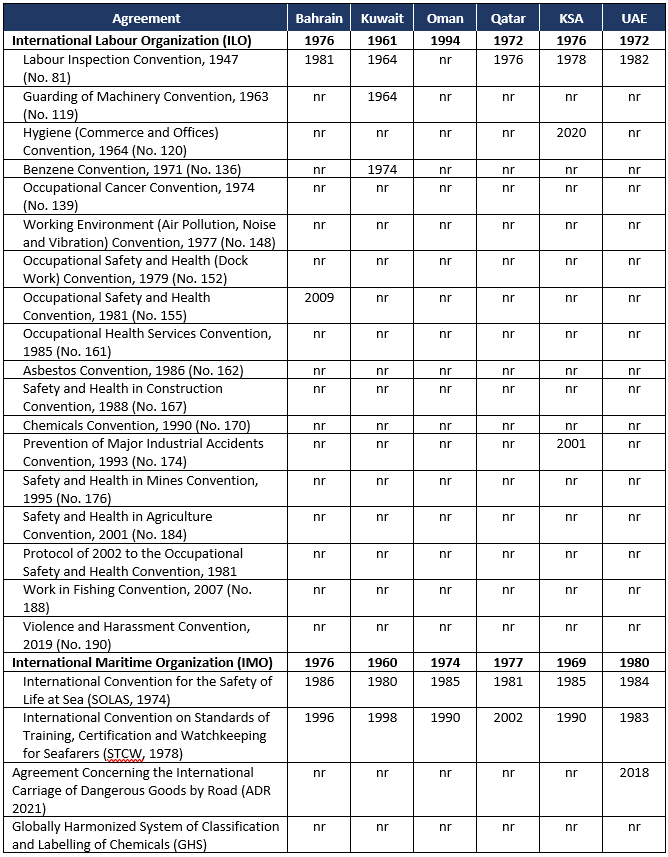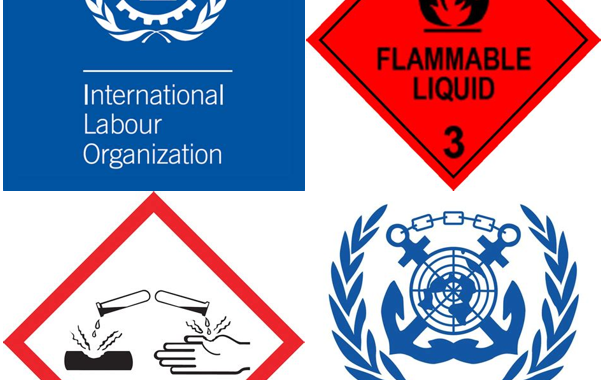In this second article of the series HSE Regulatory Requirements Across the GCC, I focus on international agreements related to worker health and safety that may be of interest to those working in the region.
Companies operating within the GCC member countries need to comply with the HSE regulations in the jurisdiction(s) within which they operate. As such, those individual responsible for HSE management tend to be well versed in the local regulatory regime and the main laws and regulations that are pertinent to their facility.
What is less well know, however, are the many international agreements related to worker health and safety or environmental protection and that have been ratified by member states within the GCC.
These agreements may directly or indirectly affect companies operating in the GCC, via:
- Legal compliance: Many of these agreements are legally binding and require compliance by member states. Failure to comply with these agreements could result in legal and financial penalties for companies operating within the member states.
- Reputation and stakeholder expectations: Increasingly, customers, investors, and other stakeholders are demanding that companies operate in a socially and environmentally responsible manner. Compliance with these agreements can demonstrate a company’s commitment to responsible business practices and improve its reputation among stakeholders.
- Access to markets: Compliance with these agreements can also facilitate access to international markets. Many countries and companies require that suppliers meet certain environmental and social standards as a condition of doing business.
- Operational efficiency and risk management: Compliance with these agreements can also help companies manage operational risks related to worker health and safety and environmental impacts. Implementing best practices related to worker health and safety and environmental management can improve operational efficiency and reduce the likelihood of accidents and environmental incidents.
- Continuous improvement: Many of these agreements are designed to promote continuous improvement in worker health safety and environmental management. By complying with these agreements, companies can stay up-to-date with the latest best practices and technologies, which can improve their competitiveness and resilience over the long term.
Nomenclature related to international and multinational agreements can be complex, and understanding these basic terms can help to provide a clearer understanding of the process by which these agreements are negotiated, ratified, and enforced. Some of the keys terms include:
Agreement: An agreement is a broad term that can refer to any type of international or multinational agreement, including conventions, protocols, and other types of treaties.
Convention: A convention is a type of international treaty that is negotiated and adopted by member countries of an international organization, such as the United Nations. Conventions are generally considered to be legally binding on the countries that ratify them.
Entry into force: The entry into force of an international agreement refers to the point at which the agreement becomes legally binding on the countries that have ratified it. This usually requires a certain number of countries to ratify the agreement before it can enter into force.
Multilateral: The involvement or participation of multiple countries or parties in an agreement, negotiation, or action.
Protocol: A protocol is a supplementary agreement that is added to an existing convention or treaty. Protocols are often used to update or clarify specific provisions of the original agreement.
Ratification: Ratification is the process by which a country formally approves and adopts an international agreement. Once a country has ratified an agreement, it is legally bound to adhere to its provisions.
Signatory: A signatory is a country that has signed an international agreement, indicating its intent to ratify the agreement at a later date.
Treaty: A treaty is a legally binding agreement between two or more countries, and establishes specific obligations, rights, and responsibilities for each party involved. Once a treaty is signed, it becomes binding on the signatory parties, and they are expected to comply with its terms and provisions.
Worker Health and Safety – Key International Agreements
International Labour Organization (ILO) Conventions: The ILO is a specialized agency of the United Nations that promotes social justice and promotes decent working conditions worldwide. The ILO has adopted several conventions and recommendations on occupational health and safety that provide guidance to member states on how to ensure safe and healthy working conditions for all workers. These conventions and recommendations cover various aspects of occupational health and safety, including the prevention of accidents and occupational diseases, the provision of medical care and compensation to injured workers, and the promotion of workplace health and safety policies and programs. All GCC countries are members of the ILO and are required to report on their implementation of ILO conventions and recommendations on occupational health and safety as part of their obligations under the ILO’s supervisory mechanisms. While GCC countries have only ratified a few of ILO’s technical conventions related to worker health and safety (see the table below), they have implemented local HSE legislation and regulations that are consistent with many of these conventions.
International Maritime Organization (IMO): The IMO is a specialized agency of the United Nations that promotes safe, secure, and efficient shipping worldwide. The IMO sets international regulations and standards related to shipping, including safety, security, and environmental protection. All GCC countries are members of the IMO and are required to report on the implementation of IMO conventions and standards and to develop national legislation and regulations that are consistent with IMO conventions and standards. All GCC members have ratified the International Convention for the Safety of Life at Sea (SOLAS, 1974), which is the most regarded as the most crucial treaty regarding safety at sea.
United Nations Economic Commission for Europe (UNECE) European Agreement Concerning the International Carriage of Dangerous Goods by Road (ADR): ADR is a multilateral agreement that sets out the regulations for the transportation of dangerous goods by road in Europe and has been adopted across in the UAE. ADR regulations provide a framework for the safe transportation of dangerous goods, including requirements for labeling, packaging, and documentation. UAE is the only country in the GCC that has adopted ADR.
Globally Harmonized System of Classification and Labelling of Chemicals (GHS): GHS is an internationally agreed-upon system developed by the United Nations for the classification and labeling of chemicals. GHS aims to ensure that chemicals are managed safely throughout their entire lifecycle, from production and transport to use and disposal. The system uses standard criteria for classifying chemicals based on their physical, health, and environmental hazards, and provides consistent labeling and safety information (safety data sheets) to help protect people and the environment. In October 2019, the GSO (GCC Standardization Organization) published a draft for implementing GHS in the GCC countries. Implementation of the Globally Harmonized System is expected to happen by mid-2020. After the implementation of GHS, there will be a grace period of 2-3 years for the six countries to place the new law in their legislation.
GCC Standardization Organization (GSO): The GSO was established by the GCC to develop and promote intra-trade, consumer protection, environment and public health standards and regulations across the GCC member states. The organization has developed several standards related to protection of worker health and safety such as those for personal protective equipment (PPE), measuring and evaluating noise exposure, indoor air quality measurement, and occupational health and safety management systems.
Multilateral Environmental Agreements (MEAs): Some MEAs also have provisions related to worker health and safety, such as the Rotterdam Convention on the Prior Informed Consent Procedure for Certain Hazardous Chemicals and Pesticides in International Trade, which requires the informed consent of importing countries for hazardous chemicals, and the Stockholm Convention on Persistent Organic Pollutants, which aims to eliminate or restrict the production and use of persistent organic pollutants. These MEAs are discussed in the next article in this series related to environmental protection.
The following table summarized the status of these agreements across the member states of the GCC, dates shown are the years in which each country joined the organization or for which the agreement came into force.
Key International Worker Health and Safety Agreements nr – not ratified.
nr – not ratified.
In the next article in this series, we discuss key international agreements related to environmental protection.
As always, feel free to contact us if you need help with your HSE challenges at your site.
Thanks for reading. Keep safe. Be healthy. Respect your environment.
I hope that you will bookmark the blog, share it with your colleagues and visit the blog frequently because you find it informative and helpful. I value your feedback and suggestions for future topics.
Please enter your email in the box at the top of the post and subscribe to our blog HSE Asia – our weekly blog will be emailed directly to you.
- Is Your Business Compliant with HSE Regulations? Take Our Quiz to Find Out! - September 16, 2024
- Duty of Care: What it Is and What it Means to Companies Operating in the GCC? - January 28, 2024
- Free E-Book:Health, Safety, and Environment Regulatory Review – United Arab Emirates: An Overview of Federal Requirements - July 5, 2023
